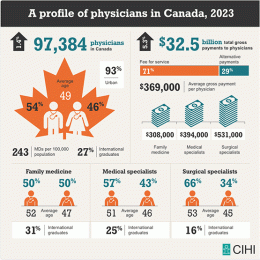Doctors With Borders

By Mata Press Service
Canada’s systemic discrimination against internationally trained doctors continues to sideline thousands of qualified professionals, even as the country faces a worsening shortage of physicians, states the Canadian Medical Association (CMA).
It is now calling on newly minted Prime Minister Mark Carney to act decisively and streamline the credentialing system that keeps international medical graduates (IMGs) from contributing to the nation’s collapsing healthcare landscape.
According to the CMA, more than 6.5 million Canadians lack access to a family doctor. In B.C. alone, roughly 400,000 residents remain on waitlists for a family physician.
The CMA’s call follows a report pointing to a deeply flawed licensing and residency process that undermines equity and wastes critical healthcare talent when Canada is grappling with severe doctor shortages.
Based on 15 years of data, the investigation was compiled by the Alliance of Doctors Denied by Degree (ADDD) and MOSAIC, a leading settlement support group for newcomers.
“Despite passing the examinations that establish IMGS are qualified and meet the Canadian standard to work as resident physicians, IMGS are restricted from applying for approximately 90% of resident physician positions in Canada,” the report states.
At the heart of the issue is a residency system that overwhelmingly favours Canadian medical graduates (CMGS). In 2023, just 370 out of 3,532 residency positions — a mere 10% — were made available to International Medical Graduates (IMGS), even though they had passed all the required qualifying exams.
“There are more positions than applicants in the CMG Stream… and substantially fewer positions than applicants in the IMG Stream,” the report notes.
Every year, between 1,200 and 1,900 qualified IMGS are shut out of the system. And while CMGS can apply to 36 specialties, IMGS are limited to just 25, with many disciplines completely off-limits. Over half of IMG-designated slots are in family medicine — a field that is underpaid, underserved, and struggling to recruit.
Beyond restricted access, IMGS face a more demanding path. They must complete both the MCCQE1 and the NAC OSCE exams before applying for residency. In contrast, CMGS can begin residency without passing either.
The result is a two-tiered system where equally — or more—qualified candidates face steeper requirements and fewer opportunities.
The report includes survey responses from hundreds of IMGS across the country who shared stories of rejection, underemployment, and financial strain.
Many described a recurring narrative of being told their international qualifications were “subpar” or “not to Canadian standards.”
“A doctor with five or ten years of experience… was equated to a recent Canadian graduate, thus devaluing their professional experience,” one respondent said.
Others questioned the logic of repeated English testing, especially for those already living and working in Canada.
“Why does one have to repeat every two years? Will one forget English in two years?” asked another IMG.
The economic and emotional toll is clear. Many foreign-trained physicians have taken on non-medical jobs to survive or are considering leaving Canada altogether for countries with more transparent and inclusive licensing systems.
“Outcomes for IMGS include financial hardship, working in non-medical positions, and underemployment,” the report concludes.
The report also highlights troubling racial and socioeconomic disparities. Nearly 75% of IMGS surveyed identified as visible minorities, and white IMGS were significantly more likely to become licensed. IMGS from Asia, Africa, and Latin America face the steepest barriers. Data also shows most IMGS come from lower-income households, while CMGS tend to be from families earning over $125,000 annually.
The report calls for sweeping reforms, including transparent data collection, more residency spots, equal competition for positions, and an end to unnecessary language tests.
“Systemic discrimination will be addressed when we understand the different realities faced by each of the IMG groups in Canada,” the report states. “We cannot address what we cannot see.”









